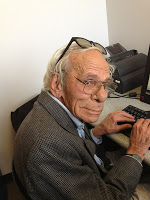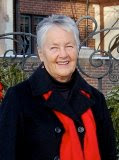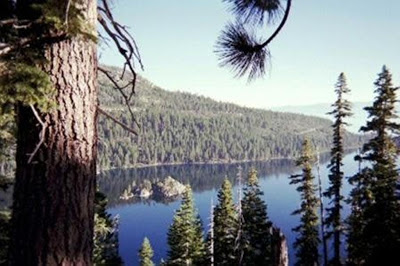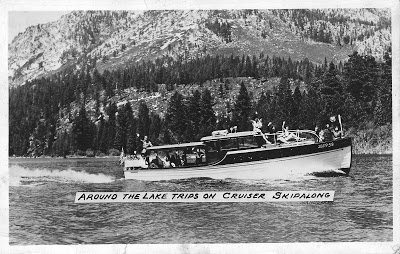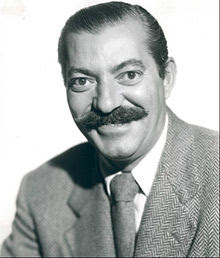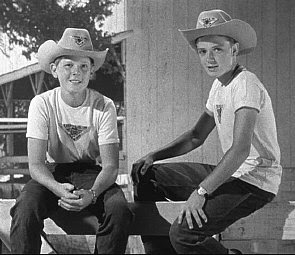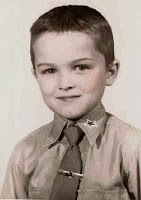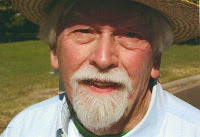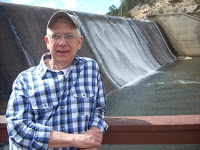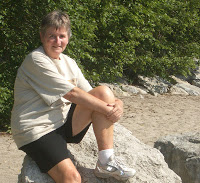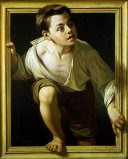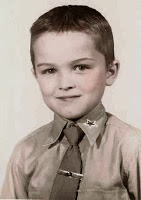many many happy days being my Beautiful Betsy’s athletic supporter as she rides
hither and thither and yon around the country, most of my bike stories are not
particularly positive.
was, as with many of us, on a tricycle. It was the summer before I turned five
and started school, and being an only child I had led a pretty solitary,
sheltered, life up to that point. I never owned a tricycle myself; this was an
old one which my cousin Peter had outgrown. Peter was four years older than me,
and it was he who led me off on this adventure.
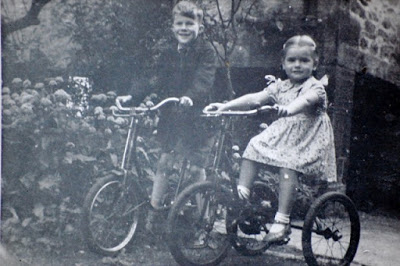 |
| Peter & Gillian just before starting on the adventure. |
We started off sedately enough
down a paved lane which became a muddy cattle trail which in turn became a
steep, narrow path hurtling down from the pasture to the river. Peter, also an
only child and not averse to having someone, especially a soppy little girl, to
show off to, shot off down the path on his boys’ two-wheeler, pedaling as fast
as his legs would turn, and letting out some pseudo-macho, pseudo-cowboy, yell.
I, oblivious to lurking dangers, rushed to keep up. Had I had anything beyond
zero experience on a trike, I would, of course, have known that three wheels on
a path like that were, at very best, going to get hopelessly stuck. But I
headed off in blissful ignorance, full speed ahead and damn the torpedoes!
long before I could get stuck in the mud, the front wheel hit an exposed tree
root and I ended up, or rather, down, face first onto a lump of granite, which
seriously loosened by two front baby-teeth. Meanwhile, Peter, arriving safely
but too swiftly at the end of the path, was unable to stop his bike and ended
up in the river. There had been recent thunderstorms in the hills and the river
was an angry brown torrent. Luckily for Peter, he and his little bike tangled
up together and jammed between two rocks, where he hung on for dear life and
yelled for yelp. This story might have had an unhappy ending, but my aunt,
casting a suspicious eye on her son as do most mothers of nine-year-olds,
observed us heading off across the pasture on the bluff above the river, where
he was, I later learned, forbidden to take his bike, and gave full chase. So,
other than, later that day, my uncle pulled out both of my battered front baby
teeth, we were little the worse for wear.
with Peter again, though we both rode bikes. I rode mine for purely practical
reasons; it was a way to get around. Peter rode to get around, but also rode
just for the fun of it. Then he went on long rides as a member of a bicycle
club, and did a little competitive racing. His daughter eventually married a
serious cyclist, though she never cared for bike-riding herself. Her husband
was in France training for the Tour de France when he died, on his bike, of a heart
attack. It turned out that he had some abnormal, and relatively rare, heart
condition, about which the details were never very clear and I forget if I ever
knew the correct term. He was only in his twenties when he died.
my cousin Peter, in his sixties, was riding his bike home from a nearby harbor
where he had been fishing. He died, on his bike, of a heart attack. As if two
men in the family dying of heart attacks while riding bikes was not coincidence
enough, the autopsy showed him to have the exact same heart condition as his
erstwhile son-in-law. And some like to say there is no such thing as
coincidence!
bike-riding at the time of the heart attacks was also coincidental. Both men
could as easily have succumbed to their heart conditions anywhere, anytime; as
likely to die reading the paper on the couch as to die on a bike.
admit that when I got news of Peter’s death, and the circumstances, it scared
me. Two members of my family dead on the very seat of a bicycle, and I was
deeply in love with, and committed to, an avid bicycler. You must admit, it
would give you pause! And shortly after that, Betsy decided to go on her ride
from Pacific to Atlantic, an endeavor which of course I wholeheartedly
supported even while it rather gave me chills. I just had to get over it, which
in the event was not so very difficult. My anxiety level decreased rapidly as I
tried to consider it rationally. I decided it was actually good. I was what
Robin Williams refers to in his Garp persona, as ‘pre-disastered’. To
have such a thing happen twice in one family is extraordinary; a third time is
surely out of reach of reality. I even began to be amused, thinking of Sherlock
Holmes’s musings,
considered unfortunate, but to lose three?’
shook it off. Now I never think of it. We are already too old to die young, and
if, by some horrible chance, Betsy should be stricken by a lethal heart attack
while riding her bike, hey, thank you kind fate. To die suddenly and swiftly in
the midst of an activity you love. Who could ask for anything more?
nothing to do with my story other than the topic, I have to include a simply delicious
quote I stumbled upon.
was a kid I used to pray every night for a new bicycle. Then I realized that
the Lord doesn’t work that way so I stole one and asked Him to forgive me.
was born and raised in England. After graduation from college there, I moved to
the U.S. and, having discovered Colorado, never left. I have lived in the
Denver-Boulder area since 1965, working for 30-years at IBM. I married, raised
four stepchildren, then got divorced after finally, in my forties, accepting
myself as a lesbian. I have been with
my wonderful partner Betsy for thirty-years. We have been married since 2013.

